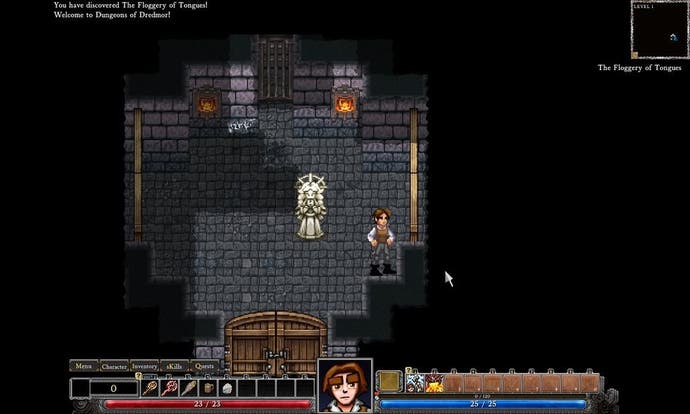Dungeons of Dredmor
"He fought like a sacrifice."
Brutal, sneaky, and faintly inhuman, it's surprising how comforting a really good roguelike can be. Losing yourself in a procedural maze of loot and monsters and incessant violence increasingly seems like spending the evening with an old friend - albeit an old friend that often backs you into corners and kills you without a moment's notice. We've all got a few friends like that, right?
Dungeons of Dredmor even looks like an old friend. This is NetHack with an early-nineties LucasArts presentation slapped on top: gangly, squelchily-animated characters, a lead who appears to be Guybrush Threepwood by way of Stan Sitwell, silly names for the potions and armour that includes traffic cones and starched shirts alongside gleaming chest plates and greaves (a standard fantasy shin-guard word that I really must look up one of these days). One of the skills you can pick at the start of the game even pushes you into battle with a Fedora equipped, bringing back all the right memories of the Fate of Atlantis. It's wonderfully inviting stuff.
If you know your way around this bitterly lovable genre, you'll be instantly at home. Gaslamp's game is all about whacking monsters, picking up treasure and inching your way from floor to floor as you seek to take down Lord Dredmor, who's done something terrible that I keep clicking past too quickly each time I start the game over.
That said, even seasoned travellers might find it wise to poke their way through the pithy little tutorial; although Dredmor feels pretty compact to play, it's been fearlessly inclusive in its approach to mechanics. Side-quests, skill trees, ranged combat, traps and even a comprehensive crafting system: everything gets a look-in, while your character sheet is filled - perhaps too full - with dozens of tiny numbers to watch steadily ticking upwards as you ramble deeper into the game.

There are some lovely systems in place here. Instead of character classes, you pick a starting load-out of seven skills from a collection of 34 (I counted). While you can read through all the little descriptions, for your first few play-throughs it's probably worth just pressing the random button and seeing what you end up with.
Alongside standards like boosts for each particular weapon class, you can use vampirism to change the way you regain health, opt in and out of various magic abilities - a typical example is Viking Wizardry - and improve your chances with burglary, critical hits, and handling fungus. It makes for a system with great tactical depth and replayability: heading back into the dungeon with a different build can lead to an adventure that feels nothing like the last one - and that's before you start augmenting your character as you level up.

